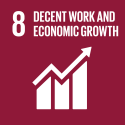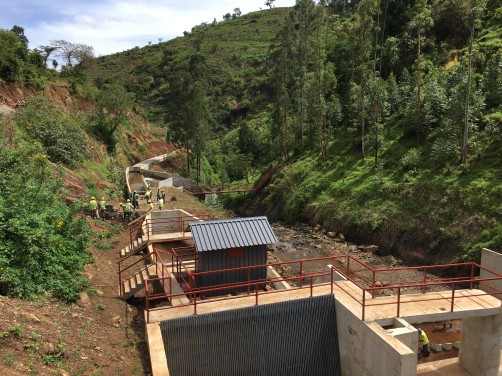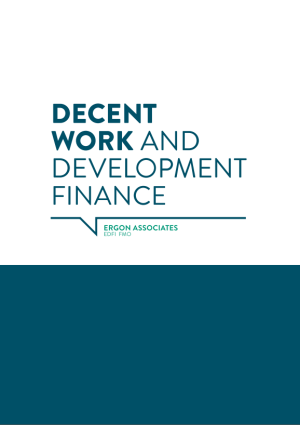“Experience shows that economic growth, on its own, is not sufficient. We must do more to empower individuals through decent work, support people through social protection, and ensure the voices of the poor and marginalized are heard.”
Ban Ki-moon (Former UN Secretary-General)
Today, FMO has launched a report on Decent Work and Development Finance. It is the first study of its kind to set out the best practices of Development Finance Institutions regarding the principle of job quality - what it means in the field, and how it can be supported.
 Decent Work (SDG 8) is a critical development objective, given that entities financed by EDFI members (the Association of European Development Finance Institutions) support at least two million jobs directly.
Decent Work (SDG 8) is a critical development objective, given that entities financed by EDFI members (the Association of European Development Finance Institutions) support at least two million jobs directly.
The report, produced by Ergon Associates, is based on efforts by FMO and other institutions to collect feedback from environmental and social specialists, development effectiveness specialists and other stakeholders, and aims to collate best practices for other banks and investors to follow. It may also be of interest to other organisations active in the development field, such as trade unions and civil society organisations.
The report is produced as input to the Let’s Work Partnership, a group of 28 international financial institutions focused on private sector development whose aim is to coordinate the creation of more and better private sector jobs in emerging economies.
What does Decent Work look like?
The report is pioneering in its definition of what Decent Work looks like in practice for financial institutions in emerging markets and what institutions and their partners are working toward.
“From the strategic perspective, the report tells us what we are doing well,” says FMO evaluation officer Corianne Van Veen. “While not a lot of structural data on job quality is available yet, it will help us to quantify a way forward, and provides us with a valuable insight into what our partners and we are already achieving.”
Defining improvements within the workspace in emerging economies is a complex task, given the broad range of projects and financing activities. While it is difficult to adopt homogenous standards, more can be done.
“The study helps to identify options for a systematic approach to labour quality, but there will need to be a high degree of latitude for what each organisation is able to do,” says Van Veen. “For FMO, it currently means taking a bottom-up view and adopting a systematic approach to improve labour quality in energy projects.”


Setting standards in Ugandan hydroelectric power
FMO has chosen to focus on projects within the energy sector as its first step toward enhancing the quality of work. An example is a portfolio of hydroelectric plants in Uganda, where FMO has been working with local and overseas partners to help the country to meet its alternative energy generation goals.
Here FMO has played a catalytic role in cascading improvements down to the supply chain, beyond the direct client. Its job quality approach and standards have influenced both pay and working conditions of a largely unskilled and vulnerable workforce, whose livelihoods and of those co-dependent family members are heavily reliant on one earner.
Part of the challenge faced by development institutions is illustrated clearly in Uganda, where many workers lacked a national ID that is the basis for proper monitoring of working hours and regular wage payments. Solutions had to be determined on a project basis, but progress here could lay the foundations for wider-ranging changes.
“Starting the conversation meant understanding the local situation and the how labor is costed in existing construction contracts,” says FMO environmental and social officer Oana Raluca Craciun.
A key part of the importance of the work in Uganda is the projects’ role as a model that can be adopted by other partners and institutions as they seek to work with clients on improving job quality.
As UN Secretary-General Ban Ki-moon rightly stated, payment levels and employment figures go only part of the way toward addressing social inequalities in developing economies. The Decent Work report, presented at the EDFI Impact Conference, and the issues it highlights will help the development finance community address the importance of quality in the work experience for those we are seeking to support.
Please click on the picture below to read the full report





